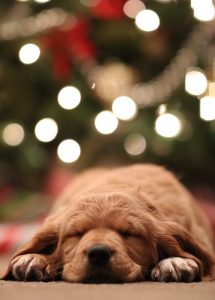 As homes begin to fill with holiday cheer, curious pets can become enticed by the new sights, smells, and tastes of the season. While you decorate, cook, and wrap gifts, be sure to steer clear of these potential holiday hazards.
As homes begin to fill with holiday cheer, curious pets can become enticed by the new sights, smells, and tastes of the season. While you decorate, cook, and wrap gifts, be sure to steer clear of these potential holiday hazards.
Christmas Trees
These beacons of the season, though beautiful, can pose some dangers to your pet. Be sure to securely anchor your tree to prevent it from tipping or falling as curious pets run around the base or try to climb them.
If you decide this year to go with a real tree, sweep the area regularly for fallen needles that can bunch together causing an intestinal obstruction, which can lead to severe consequences if swallowed. Be mindful of your pet if they begin to bite or gnaw on a tree limb or the base of the tree. Tree oils can cause irritation leading to vomiting, drooling, and possible inflammation and swelling. Prevent your pet from drinking tree water by covering the water dish as it may contain chemicals or fertilizers for preserving your tree that may be toxic to your pet.
Festive Flowers and Plants
Holiday plants are an excellent way to brighten spirits within a human, but some prove dangerous if ingested by your pet. Common holiday plant hazards include amaryllis, azaleas, chrysanthemums, holly, juniper, lily, mistletoe, and poinsettias. We recommend using artificial plants or choosing pet safe flower arrangements for the holidays. It is important to remember that even non-toxic plants can cause gastrointestinal upset if consumed in large amounts.
Holiday Feasts
As tempting as it may be to share with your pet, holiday foods can be especially fattening and hard for animals to digest. This can lead to an upset digestive system or even more serious medical conditions such as pancreatitis which can become life-threatening. This includes bones, no matter how small, as they can become lodged in the throat, stomach, and digestive tract requiring surgery to remove.
Chocolate or any treats sweetened with xylitol can be harmful to your pet’s health. Be sure to keep your pets clear of the table, unattended plates of food, and open containers. Securely fasten the lid of your garbage cans at all times. If you wish to include your pet in the holiday feasts, we recommend giving them made-for-pet treats.
If you believe your pet may have been poisoned or eaten something he shouldn’t have, contact your veterinarian right away or call the ASPCA Poison Control Hotline: 1-888-426-4435.
Lights
Decorative lights on the tree and around the house can pose an electrical hazard if chewed. Signs of electrical shock can include oral burns, abnormal heart rhythm, loss of consciousness, and seizures. To keep your pet safe, we recommend using electrical cord covers, organizers, and hanging lights out of reach.
Tinsel, Ornaments, and Decorations
Brightly colored garlands, flashy tinsel, gorgeous dangling ornaments, and tempting candy canes are all part of getting into the holiday season. However, they can be eye-catching toys for curious pets. Keep breakable decorations out of reach as a playful swat can lead to a nibble or swallow. If swallowed, these decorations can lead to obstructions in the digestive tract, tears in the stomach, vomiting, and dehydration.
Additional Winter Care Safety
Winter can be a wonderful time to enjoy with your pet, but the cold weather can also bring about hazards in and outside of the home. Here are some helpful tips on how to care for your pet during the season:
- Dress your pet for the outdoors with a sweater, jacket, or vest to keep him warm. If you think you’ll be cold, your pet most likely will be too. Booties are another great idea to help keep his paws warm and dry.
- Be mindful of indoor space heaters as pets can easily bump into a heater and become burned.
- Store antifreeze and ice melting agents away from pets as they can be harmful if ingested.
- Check under the car and bang the hood before starting your vehicle. This will help to startle slumbering pets who may have taken shelter the night before underneath your car.
The holiday season should be bright and merry and so we hope our tips and advice will help keep both you and your pet happy and safe during these winter holidays. For more information on holiday safety or to schedule an appointment, contact Babcock Hills Veterinary Hospital, P.C. today.

